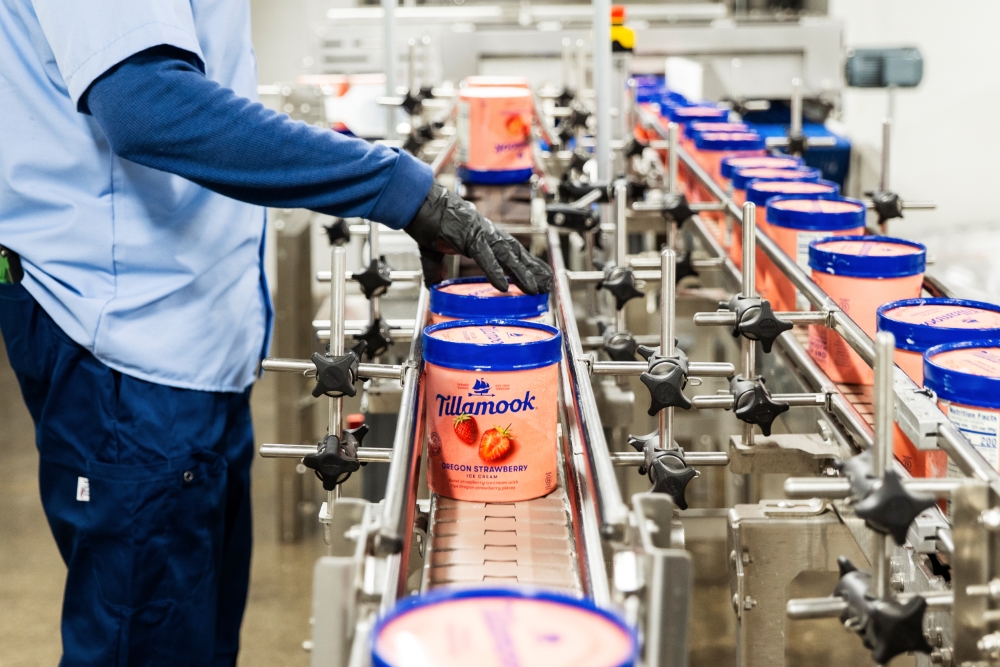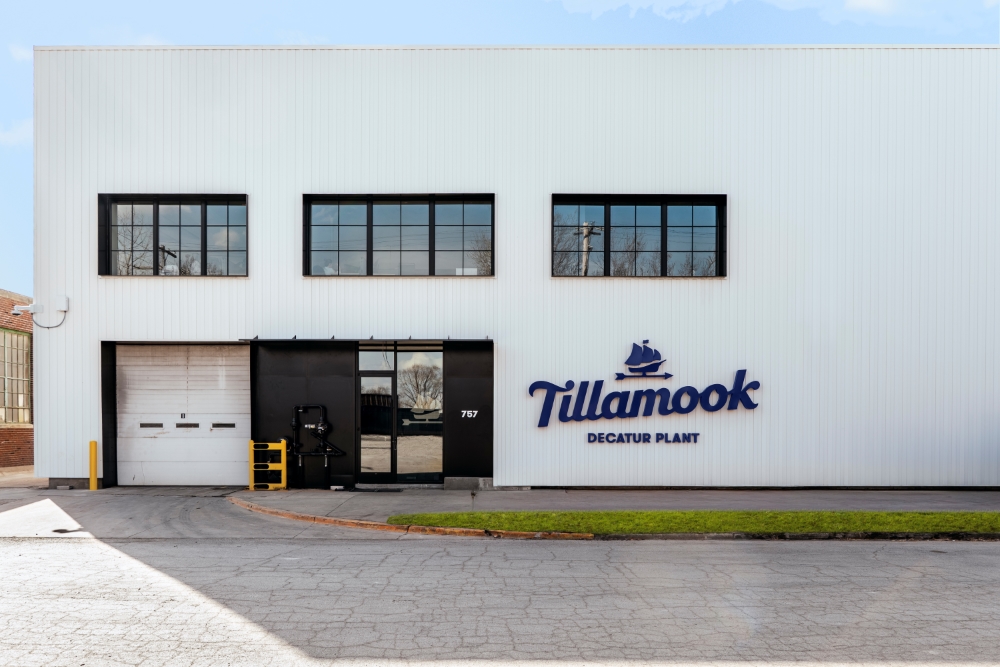Increased product demand is a welcome challenge for any company, especially when a farmer-owned cooperative becomes the nation’s fastest-growing ice cream brand. In the past four years, over 4.4 million new consumers set out to purchase a 48-ounce family-sized Tillamook ice cream tub, and more than half of these sweet teeth were located on the U.S. East Coast.
There was just one not-so-sweet logistical problem— the Tillamook County Creamery Association (TCCA) had been exclusively churning out ice cream from its homebase in Tillamook County, Oregon, for the past 116 years.
A milestone moment had arrived. The company decided it was time to explore a national expansion for the first time since its founding.
A site selection search led TCCA to Central Illinois, a region known best for its agricultural strength. TCCA Executive Vice President and Chief Supply Chain Officer Mike Bever says the Macon County city of Decatur stood out for five reasons: the city’s strong business climate, affordable utilities, access to high-quality dairy, prime location and close proximity to new customers in the U.S. Midwest and East Coast.
“While we do not disclose the exact cost figures publicly, this facility was a major investment for our company and one that we know will continue to deliver benefits for our business long into the future,” he notes.
In June, operations officially began at the 41,000-sq.-ft. Decatur facility. Production will focus on Tillamook’s 48-ounce family-size ice cream and its 3-gallon foodservice ice cream products, although Bever says a potential growth opportunity would be incorporating a pint size depending on market demand.
No flavor will be left behind once the plant fully ramps up, as all 33 Tillamook flavors will be introduced. Fifty new jobs have been created at the facility, but that number is expected to scale alongside increased production capacity.
“We estimate that the facility will produce nearly 3 million gallons by the end of 2025, and over the next two years, we will ramp up to 15.5 million gallons annually,” says Bever. “Some flavors currently in production are Tillamook’s classic flavors like Vanilla Bean, Oregon Strawberry and Mudslide.”
The most vital aspect of this new facility was forming a partnership with the Midwest-based dairy co-op, Foremost Farms Cooperative. It is one of the largest dairy cooperatives in the nation, encompassing farmers in seven Midwest states — Illinois, Indiana, Iowa, Michigan, Minnesota, Ohio and Wisconsin— and will serve as the Decatur facility’s direct milk supplier.
“As with all our milk supply partners, Foremost aligns with TCCA’s values and adheres to the Farmers Assuring Responsible Management program standards, a common set of practices for the humane and ethical treatment of dairy cows,” Bever continues. “Which is a priority for Tillamook for all of the milk we source for our products.”
Beyond Tillamook’s new venture in the city, Decatur has become a hotspot for forward-looking industry activity.
Last year, plant-based food and industrial ingredients manufacturer Primient announced it would invest $400 million to enhance its Decatur facility. The project will modernize its feed, germ and drying processes; improve syrup refining; enhance safety and equipment; and provide workforce training and development opportunities.
Meanwhile, France-based Innovafeed launched its first U.S. Insect Innovation Center in Decatur where Hermetia illucens, also known as black soldier flies, will be bred. Direct access to the largest corn mill operations in the world, owned by ADM, utilizes ample corn-by products to develop insect meal, oil and soil amendment used for sustainable animal and pet feed.
“Innovative, exciting new approaches to agricultural and environmental challenges are what Illinois is all about, from the invention of the farm silo to global leaders like Innovafeed,” said Governor JB Pritzker. “This expansion, perfectly situated in Illinois’s rich corn country, demonstrates a commitment to Illinois as a place to grow and continue to innovate, and I’m glad to welcome Innovafeed to Illinois.”
Tasteful Confidence in Illinois
While the state has made a name for itself in several key industries, its agricultural dominance remains unwavering. The industry makes up 13% of the state’s gross domestic product, contributing about $120 billion annually to the Illinois economy. This activity has positioned Illinois as the largest exporting state in the U.S. Midwest, accounting for $13.7 billion in total exports in 2023.
Industry expertise runs deep, capable of handling every level of development from traditional farming, food processing and manufacturing to advanced research and technological innovation. In Central Illinois, one of the largest U.S. Department of Agriculture National Center for Agricultural Utilization Research (NCAUR) Centers in the U.S. is located in Peoria.
At any given time about 200 scientists are here exploring ways to advance sustainable agriculture practices and food safety and tackle environmental problems that affect public health, economic development and environmental quality. NCAUR has become a key resource promoting STEM education for educators and students of all ages throughout Illinois communities, providing various camps, career fairs, hands-on lab experience and in-depth programs throughout the year.
The addition of the Illinois Fermentation and Agriculture Biomanufacturing (iFAB) Tech Hub to the region brings a fresh layer of R&D opportunity to the University of Illinois Urbana-Champaign and over 30 research partners. iFAB leverages Illinois’ top cash crops, corn and soybeans, to pursue new biomanufacturing applications in the development of fuel alternatives, advanced food proteins, new textiles and fibers, commercial grade oils, pigments and cosmetics.
In June, National Foodworks announced the Decatur-based company would be joining the iFAB consortium as its 34th member. The contract food manufacturer works with established and startup food companies to formulate, test and scale new products, which will be a valuable resource for early production runs testing out newly discovered fermented ingredients.

Home to more than 400 agtech companies and over 2,000 food manufacturers, this level of innovative activity and collaboration is far from concentrated in Illinois. The state’s magnetic pull for companies looking to drive innovation forward has resulted in over 900,000 jobs directly related to food and agriculture, according to the Illinois Agri-Food Alliance. As companies look to shake up North American markets with exciting new products, all strategic roads lead to Illinois.
It’s what led Ferrero to invest $75 million to begin expanding its Franklin Park operations to exclusively manufacture Nutella Peanut, the company’s first new Nutella flavor to ever be released. In Huntley, Germany-based Silesia broke ground in June to establish a new $40 million manufacturing and R&D center to explore product innovation and grow its presence in the American market.
It’s hard to pass up the state’s robust supply chains, infrastructure, talent and research capabilities — and companies aren’t doing so. In the past year, Illinois has drawn in over 100 new food and beverage projects around the state as companies look to expand or cultivate new roots.

